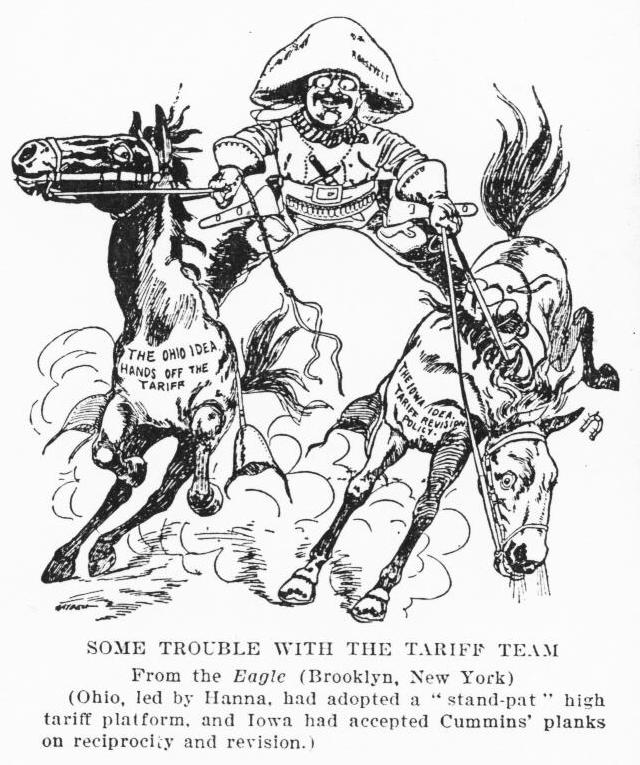Tariffs
by J. Neil Schulman
[email protected]
Special to L. Neil Smith’s The Libertarian Enterprise
It’s self-evident to anarchists that taxation is theft.
I’m an anarchist so I accept this statement as self-evident.
This does require more explanation to the non-anarchist.
Libertarian anarchists such as myself see no special status for the State—“government,” in more common language—that gives human beings acting within or on behalf of government any greater rights or rightful powers than any private individual. If it’s wrong for me to use a gun—or join with others into a gang armed with guns—to take someone else’s property or money, then the rituals of elections do nothing to create a moral basis for doing so. Therefore any tax is merely theft with propaganda to disempower the victim.
But there are relatively few anarchists. Most people subscribe to the view that government has rightful powers to take private property or the result of an individual’s labor and put those takings into a “public” till where a monarch or chairman or president or committee or congress may spend it according to their own decisions, often with the claim that they are not acting in their own interests but for All the people.
History often shows this claim to be tenuous at best, and when those with public trust are caught acting for themselves it’s called “corruption”—on the premise that better men can be trusted with the power to spend forcibly taken wealth.
So anarchists are simply self-selected to be outside discussion of tax policy.
I’m not just an ideologue, though. I’m a novelist. Filmmaker. Essayist. Journalist. Self-appointed philosopher.
So screw the anarchists who want me never to compare one kind of taxation with another. I recognize no other anarchist as having the right to tell me what I shouldn’t write about.
The most egregious kinds of taxes are those which require complex bookkeeping and revelation to the government how you spend your money.
The least egregious kinds of taxes most resemble the basic thief: after the property is stolen you don’t have to fill out any forms and explain what you were intending to do with the stolen funds.
Government is least oppressive when it recognizes its thieving nature and doesn’t rape its victims, too.
To the best I can see, that’s what the Framers—those old white men who conspired to impose a Constitutional Republic on the men who’d just fought a war to get free of another tyranny—had in mind. A government of thieves, but fewer rapists. Constitutional conservatives and Limited Government Libertarians seem to be of that sort.
The constitution as originally constructed had as sources of government revenue tariffs on imported goods. There were no income taxes on either individuals or businesses. There were no sales taxes or value-added taxes. There were no estate or death taxes.
Then again, government wasn’t expected to provide public schools, or health care, or old-age pensions, or support for mothers who had children but no husbands.
These socialist ideas were already common at the time. Marx and Engels were distant latecomers to socialist thinking.
As an anarchist I have this to say about tariffs: they’re not as bad as today’s income taxes. My non-anarchist friend Brad Linaweaver notes, “Tariffs are a tax that sometimes goes away. The progressive income tax never goes away.”
The comparative intrusiveness of one tax versus another is not my point.
This is my point: tariffs are a tool of foreign policy. The foreign policies—I must note for my anarchist friends—of States.

It’s another anarchist premise that all governments are bad. Further, that the government nearest you is the worst.
I’m accused by anarchists of being a sell-out because I do not accept that premise. I think that some foreign governments are far worse than the one I live under.
Restricting myself to 2019 (history just muddles it) I think far worse than the government here in the United States are the People’s Republic of China, the Democratic People’s Republic of Korea, the Republic of Cuba, and the Bolivarian Republic of Venezuela. These are the worst of one-party-rule aggressive communist States. Lots of other governments suck. But these are among the worst of the worst.
Libertarians at institutes such as Reason, CATO, and Mises—almost all libertarian pundits who have podcasts or get invited onto TV—favor Free Trade. Being a libertarian I, also, favor free trade.
Here’s where I part with the rest of the libertarian punditariat: I do not consider either trade pacts or trade wars between States to have a blessed thing to do with free trade.
Okay, I guess I do need to bring in history.
Let’s go back to the United States before Fort Sumter.
I would have favored any sort of trade barrier that stopped slave-labor plantations from exporting their slave-picked cotton. Because the Constitution forbade such tariffs between States it was not legally possible domestically. Nonetheless I would have encouraged foreign governments to pass exorbitant tariffs on importation of American slave-picked cotton.
One can make a strong case that the communist States I listed above—China, North Korea, Cuba, and Venezuela—are as much slave states as the antebellum American South.
So—as a libertarian—I do not consider tariffs against importing their slave-made goods—or sales of American goods to the profiteering slavemasters—to be against the principles of free trade I support.
To be specific, I’m talking about officially approved trade. If trade can be accomplished by blindsiding these evil statists and trading directly with secret traders– black-market, countereconomic, Agorist trade—I’m fine with that. Nevertheless one of hallmarks of totalitarian regimes is ubiquitous surveillance, corruption, and blackmail. An Agorist would need to be very sure that one wasn’t trading with a government stooge.
Yes, tariffs are paid for in higher prices by the consumers who buy anything using tariffed components. Tariffs are taxes. Taxation is theft. But it’s also true that marketplaces adapt to tariffs.
If new tariffs reduce sales of Maine lobsters being sold to Chinese plutocrats, prepare to line up at Red Lobster and Outback for lobster specials. If California almonds are not being loaded in freighters to China, I expect the price of the almond butter I buy at WalMart to drop.
Can’t sell soybeans to China? What, nowhere else on this planet wants American-grown soybeans? And with Internet trading can’t the orders be redirected to new buyers almost instantly?
The economic arguments that treat tariffs as static trade barriers are merely talking points. The market for any good is dynamic and any bilateral Trade War opens up opportunities for other buyers and sellers.
Yes, Tariffs are Taxes, which as we know are Theft.
However, if a tariff even marginally deprives the worst totalitarian statists on this planet from their evil schemes—and impels slaves to revolt against their masters—I can’t find it in my heart to support keeping up trade with the worst of Our Enemy the State.
Reprinted from
J. Neil
Schulman @ Agorist.com.
© 2009, 2010, 2011, 2012, 2013, 2014, 2015, 2016 The J. Neil Schulman Living Trust. All rights reserved. Web and email links with attribution permitted and encouraged. Other reprints permitted only with prior permission of the author.

J. Neil Schulman is a novelist, screenwriter, journalist, radio
personality, filmmaker, composer, and actor. His dozen books include
the novels Alongside Night and The Rainbow Cadenza,
both of which won the Libertarian Futurist Society’s Prometheus
Award for best libertarian novel, and the anthology Nasty, Brutish,
And Short Stories.
Read
more about him.
Was that worth reading?
Then why not:
![]()
AFFILIATE/ADVERTISEMENT
This site may receive compensation if a product is purchased
through one of our partner or affiliate referral links. You
already know that, of course, but this is part of the FTC Disclosure
Policy
found here. (Warning: this is a 2,359,896-byte 53-page PDF file!)
